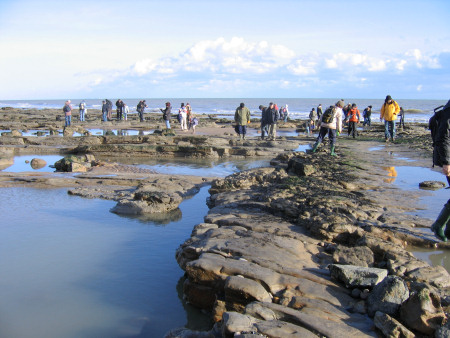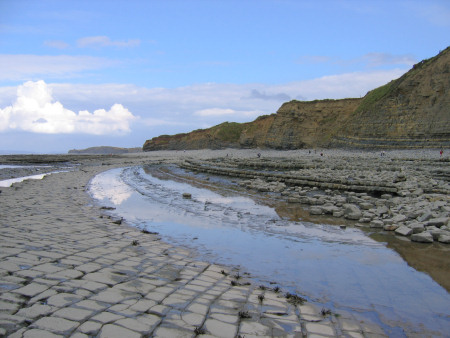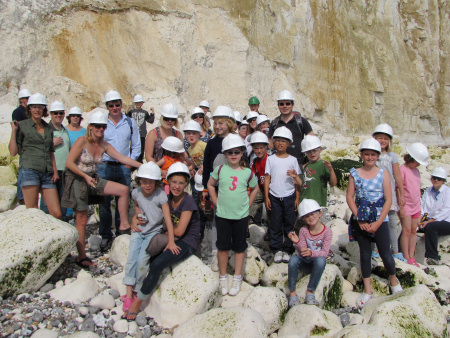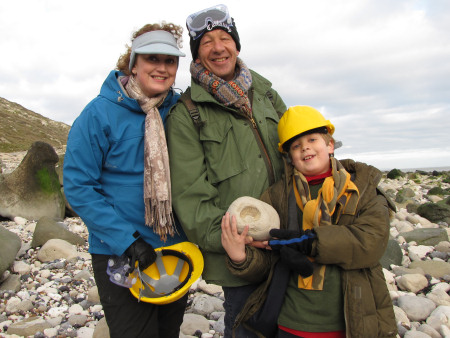Established 2002
Written and designed by Roy Shepherd. Special
thanks to my wonderful wife
Lucinda Shepherd, friend Robert Randell and various experts for their support.
Site of Special Scientific Interest (SSSI)
Lucinda Shepherd, friend Robert Randell and various experts for their support.
Site of Special Scientific Interest (SSSI)


Left: A Discovering Fossils event at Fairlight to view dinosaur footprints on the foreshore. Right: The dramatic foreshore Quantoxhead.
Sites of Special Scientific Interest (SSSIs) are the finest sites for wildlife and natural features in England, supporting many characteristic, rare and endangered species, habitats and natural features. In addition Discovering Fossils have used the 'SSSI' status in location outside England that are protected by similar rules.
The purpose of SSSIs is to safeguard for present and future generations a series of sites which are individually of high natural heritage importance. They make a vital contribution to the ecological processes upon which we all depend. Many areas designated as SSSIs make important contributions to the local economy and often provide wonderful opportunities for people to enjoy and appreciate nature.
The SSSIs cover approximately 8% of England, and alone they cannot fulfil national biodiversity and geological targets. Many SSSIs are small and isolated, and have to be managed as an integral part of the surrounding landscape. Conservation action is required throughout England if wildlife and natural features are to flourish and enrich our lives.
Supportive land use and sustainable development policies, and active conservation management, are vital to the well being of SSSIs. Partnership with owners and land managers is essential to maintain or, where past management has not been appropriate, to restore the special features of interest. The majority of SSSIs are privately owned, and those in a favourable condition owe their continued importance to the way in which their owners and occupiers have managed and cared for them.
Selecting and designating SSSIs is a key function of the Council of Natural England (formerly English Nature), whose members are appointed by the Secretary of State for the Environment, Transport and the Regions. Sites are selected after detailed scientific survey and evaluation against published guidelines. Council scrutinises all proposed sites and, if satisfied, approves the notification of every owner and occupier of the land, the local planning authority, the Secretary of State for the Environment and other organisations with an interest in the land. Council considers every unresolved representation after notification, and members play a key role in reviewing outstanding disputes over SSSI management.
Notification of SSSIs places obligations upon policy and decision makers, but does not change legal rights of ownership or public access. Natural England must be consulted over proposals to develop or change the management and use of SSSIs. This consultation process ensures that the special interest of SSSIs is not inadvertently damaged or destroyed. Natural England work closely with SSSI owners and occupiers, local planning authorities, other Government Departments and Agencies, and developers.
Natural England greatly value the stewardship and practical management undertaken by SSSI owners and occupiers. We provide advice, practical assistance, and financial support, which help owners and occupiers to manage SSSIs for the benefit of the nation. Damaging SSSIs is unacceptable, either in the short or long term, and must be avoided if they are to remain the finest wildlife and natural heritage sites in England. Once lost, the special interest of a site may be difficult or impossible to restore or re-create.


ADVERTISEMENT BY UKGE - OFFICIAL ADVERTISING PARTNER OF DISCOVERING FOSSILS


ADVERTISEMENT BY UKGE - OFFICIAL ADVERTISING PARTNER OF DISCOVERING
FOSSILS
Join us on a fossil hunt


Left: A birthday party with
a twist - fossil hunting at
Peacehaven.
Right: A family hold their prized ammonite at Beachy Head.
Discovering Fossils guided fossil hunts reveal evidence of life that existed millions of years ago. Whether it's your first time fossil hunting or you're looking to expand your subject knowledge, our fossil hunts provide an enjoyable and educational experience for all. To find out more CLICK HERE




